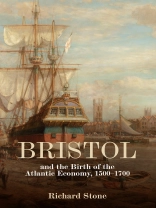Analyses data from the Bristol Port Books to rewrite the history of trade in Bristol, including the city’s early involvement with the slave trade.
The sixteenth and seventeenth centuries were a transformative period for global commerce, with the principal focus of England’s trade shifting away from trade with Europe, primarily in woollen cloth, to a new Atlantic system, with trade in a diverse range of commodities. Based on the fantastically detailed Bristol Port Books, previously thought impenetrable, and using new computer technology to analyse the vast amount of data, this book provides the first long duration history of a major Atlantic port in this period.
It rewrites the history of Bristol’s trade, overturning much established thinking, for example showing that trade flourished in the late Tudor and early Stuart period, demonstrating that Bristol was involved in the slave trade much earlier than was previously thought and charting the growth of commerce with North America and the Caribbean from nothing to three quarters of Bristol’s imports in the short period from the 1630s to the 1650s. Overall, the book represents a major contribution to understanding how the Atlantic economy worked and how it developed in this crucial period.
Inhoudsopgave
Introduction
1. The Rise of the Atlantic Economy
2. Ireland: Beyond ‘The First ‘Colonial’ Trade’
3. A ‘Quest’ for New Markets?
4. Bristol’s ‘American Revolution’: Tobacco and Sugar
5. Exports
6. Servants and Slaves
Conclusion
Technical Appendix
Bibliography
Index
Over de auteur
RICHARD STONE is a Teaching Fellow in the Department of Historical Studies at the University of Bristol












